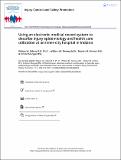Using an electronic medical record system to describe injury epidemiology and health care utilization at an inner-city hospital in Indiana
Publication Date
2010Author
Wilson W. Odero M.D. Ph.D. , William M. Tierney M.D. , Robert M. Einterz M.D. & Simon Mungai MSc.
Metadata
Show full item recordAbstract/
Injuries are a major public health problem worldwide. In the
USA, injuries cause 146, 400 deaths annually, with 31
million non-fatal injury visits to emergency departments
(EDs). EDs thus represent an important source of injury data.
The primary objective of the current study was to describe
the epidemiology of injury-related ED visits and assess
injury-related utilization of health care resources in an innercity hospital in Indiana, using data stored in a computerized
medical record system. It involved a retrospective review of
the records for injury visits to EDs and injury admissions
over a 3-year period. The variables extracted and analysed
included patients’ demographics, external cause of injury,
diagnosis, length of stay, ED and hospital charges. A total of
60,470 injury-related ED visits were made, the majority of
patients were male (61.6%), uninsured (63.1%), treated in
ED and discharged (98.4%). The leading causes of injury
were falls (18.8%), motor vehicle crashes (18.4%), assaults
(17.6%), being struck (11.2%) and overexertion (10.6).
Firearms caused most injury deaths (32.4%; n = 314); motor
vehicle crashes were the leading cause of hospitalization
(26.6%; n = 642) and also the most expensive to treat as inpatients (mean charge $19,190). The mean charge per patient
treated and discharged was $150 compared to $11,116 for
patients admitted. These findings demonstrate the value of
computerized medical records in capturing and storing Ecoded injury data. The system generates data that can be used
for epidemiological surveillance and injury prevention at the
local level, and for assessment of impact of specific injuries
on health care resources

